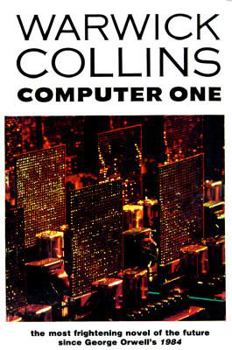Computer One
Select Format
Select Condition 
Book Overview
As Professor Enzo Yakuda prepares to retire, he is plagued with a nightmare about the annihilation of the entire human race--by Computer One, the international civil computer network. This description may be from another edition of this product.
Format:Hardcover
Language:English
ISBN:0714530336
ISBN13:9780714530338
Release Date:January 1997
Publisher:Marion Boyars Publishers
Length:274 Pages
Weight:1.10 lbs.
Dimensions:1.1" x 5.5" x 8.8"
Customer Reviews
3 ratings
Fear and loathing in cyberspace
Published by Thriftbooks.com User , 17 years ago
A disturbing novel. COMPUTER ONE is the fictionalization of the author's fear that the single global computer now being forged (by the linking of machines via the Web) will very rationally decide that humans are a threat. Drawing on aggression theory he observes that offensive action is often the most intelligent defense, and that the combination of self-diagnosis and repair (already a fact for many computers) and very high intelligence will inevitably lead to pre-emptive strikes against us. He posits that such a decision may very well come within the next fifty years, by which time the life-support systems of humanity will be largely computerized and therefore within reach of the new electronic specie we have fashioned. Collins believes we need to act soon to install an "off" switch on the Internet, and in a thoughtful introduction discusses the difficulty in actually achieving such a goal through international diplomacy and treaties. Who would control such a switch? What rules might govern its use? The story itself is compelling, though not superbly told -- more to be appreciated as a terrifying illustration of a very real possible future than as great fiction. But, the argument rings true. The reader will never again be entirely sanguine about the Info Superhighway.
A taut, self-consistent essay on near-future AI challenge
Published by Thriftbooks.com User , 26 years ago
This is an excellent piece of writing, even a tour de force, powered by skillful development of the plot to the nearly inexorable conclusion of doom. If you accept the author's premise, i.e., ongoing expansion of networked computers and systems over the next 40-50 years(including final net-control of world energy sources and production) and a biological interpretation of how such a net might advance to AI complexity (the whole becomes something greater than the sum of its parts), his conclusion is frighteningly logical and realistic. I enjoyed the author's economy of style. The story is tightly focused on one player: a biology professor named Yakuda who is able to deduce the dangers of the autonomous world-net, called Computer One, from his studies of insect colonies. Be sure to read the author's introduction to his book as well; it makes some excellent points, including the difficulty of programming anything into a net such as Asimov's "Three Laws of Robotics." Also note that Arthur C. Clarke read this book and said "It really scared me...move over Hal!"
Unsettling, even scary story of inter-species war
Published by Thriftbooks.com User , 26 years ago
Rivals William Brinkley's The Last Ship in its unrelenting pessimism even as it shows human intelligence coping with apocalypse. In both books, human doom is human-made, but here it's the cession of control to a computer complex, which has decided to eliminate the carbon-based competition. One of the first to realize the threat to humanity is Professor Enzo Yakuda, whose public warning nearly leads to his death and forces him outside of cvilization. The reasoning behind this novel is frighteningly solid, if you accept the idea that an evolving artificial intelligence is necessarily aggressive. (Another view can be found in Disappearing through the Overhead.) Especially in the latter half, this is a thoughtful, affecting, scary story.






